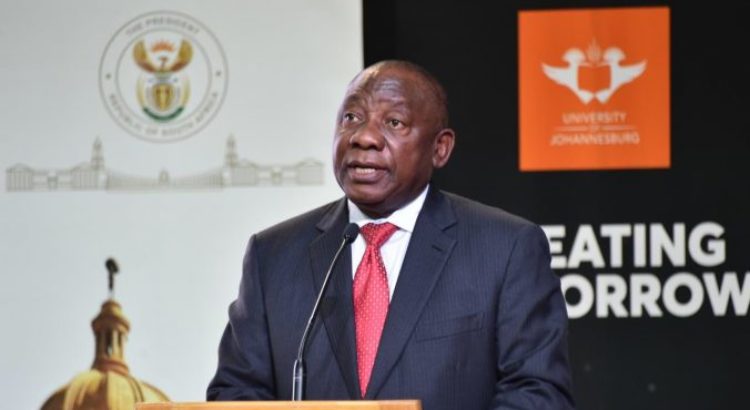All pupils are not heading to tertiary education institutions, and they need technical and ‘soft’ skills for the service sector and Fourth Industrial Revolution.
President Cyril Ramaphosa has called for a skills revolution, beginning with the altering of South Africa’s secondary education to enable it to meet the skills needs of the Fourth Industrial Revolution.
According to Ramaphosa, teachers need to be skilled to function in the modern economy. “Many of our teachers were taught in the old system of rote learning, often, they are not able to use advanced tools of the trade such as computers. Most were not trained to apply knowledge but were taught to accumulate knowledge. In today’s world, information and knowledge is abundant,” he said.
The president cautioned against the assumption that every pupil was destined to enter tertiary institutions, saying this must change and secondary education system restructured in favour of technical education, which he said empowered young people at a time when they are most hopeful, experimental and flexible in their lives.
“And we should embrace this life stage as one to empower young people to take charge of their lives and our collective future,” Ramaphosa said.
Skilling the youth would help to fight unemployment among the youth.
“Secondary education occupies a crucial role in our effort to set the people of our continent on a path to sustainable and inclusive development that will benefit all of humanity. Secondary education intervenes in young people’s lives at a time when they are most energised but also most vulnerable to adverse social influences,” Ramaphosa said.
The president, who was opening the ADEA Annual Policy Dialogue Forum on Secondary Education in Africa, at Emperor’s Palace at Kempton Park on Monday, said countries in which 50% of their pupils entered technical colleges to develop artisan skills, had lower youth unemployment rates than where the overwhelming majority entered tertiary educational institutions.
“The assumption we often make that every learner is destined to enter a tertiary institution needs to be re-examined, and our secondary education systems restructured accordingly. Our schools need to form part of a comprehensive society-wide response to the challenges and opportunities of the Fourth Industrial Revolution,” Ramaphosa said.
Rapid technological advances are already having significant consequences for workers and communities, with digitisation and mechanisation of work processes giving rise to increased insecurity and job losses. The Fourth Industrial Revolution is our current reality and it waits for no man, woman, government, pupil, student, employer or trade union.
“As we respond to the challenges of the Fourth Industrial Revolution, we should – as a continent and as a global community – put people at the heart of economic and social policy and business practices. There are remarkable opportunities – but also challenges – emerging from the dynamic forces that are transforming the world of work. To help global society navigate these challenges and opportunities, we need to invest in the capabilities of people,” Ramaphosa said.
As research indicated that 37% of the 600 million labour force in Sub-Saharan Africa was under 25 years old, Africa had great advantage, considering that most developed countries were ageing.
“They need young people to work and grow their economies while contributing to taxes to subsidise social programmes for the elderly. We in Africa can use this demographic dividend if we develop education systems that are capable, accessible and focused,” he said.
The economies of most Africa countries were unable to absorb a significant proportion of young people, mainly because their education systems were not aligned to the needs of the economy. The unemployment rate among young people was around twice that of older adults and most of the unemployed youth across the Africa were those who have completed secondary or tertiary education.
“Unemployment is lower among those who have little to no education,” he said.
The president suggested that South Africa’s secondary schools must focus on agricultural technology, considering that 205 million people on the continent were in the farming sector. The World Bank estimated the country’s agricultural market would be producing food and beverages worth $1 trillion by 2030.
“We need to ensure that young people can both read to understand and apply knowledge in the areas of agro-processing, beneficiation of fresh produce and the standards required for food export. Young people must have skills focusing on the agricultural value chain,” Ramaphosa said.
The president also mentioned the service sector as Africa’s second-largest source of jobs, employing over 100 million people in 2015. He said areas such as information, communication and technology, customer services, sales and human resources including entertainment, restaurants, tourism and transport were likely to grow in future.
“Therefore, young people need both technical skills and ‘soft’ skills. We need to overcome some barriers if Africa wants to create future jobs,” he said.
Fuente de la Información: https://citizen.co.za/news/south-africa/education/2160828/secondary-education-must-change-to-teach-pupils-skills-ramaphosa/







 Users Today : 32
Users Today : 32 Total Users : 35459498
Total Users : 35459498 Views Today : 41
Views Today : 41 Total views : 3417799
Total views : 3417799